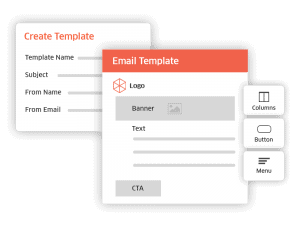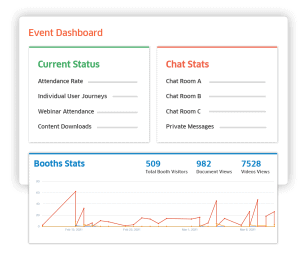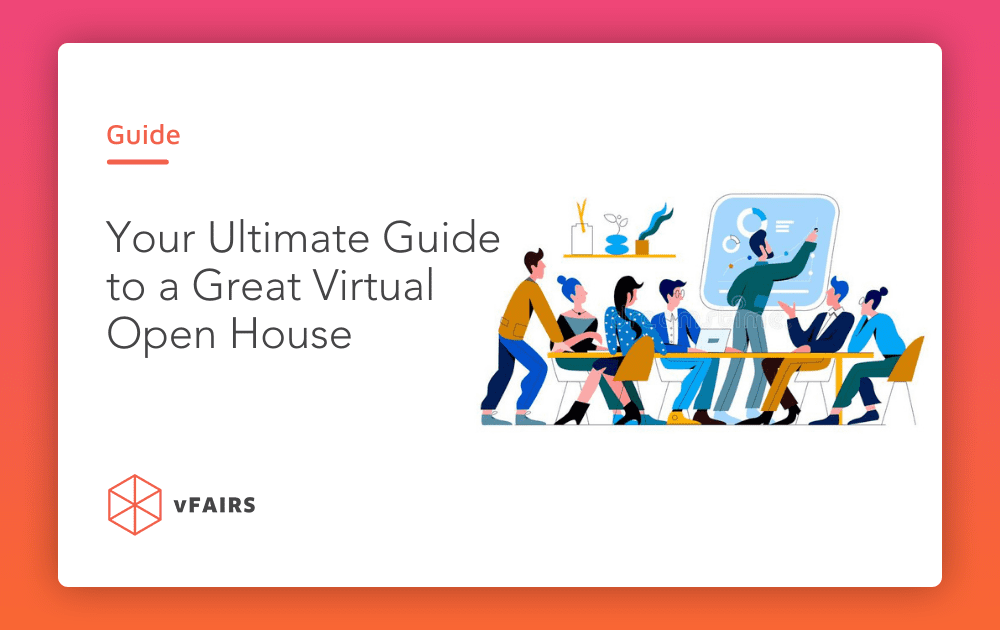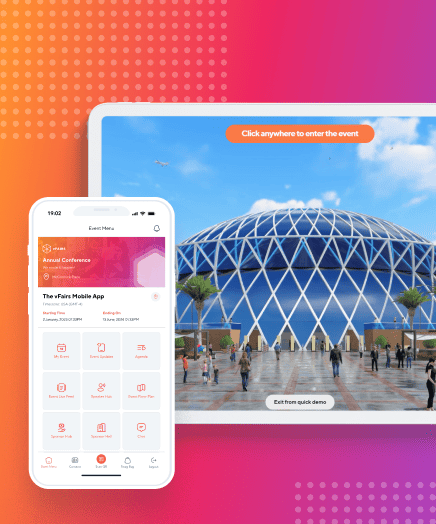If you miss the hubbub of a university open day, with prospective students milling around, then you’re not alone! Since the pandemic, university admissions are now a lacklustre process without the interactive element of before. A virtual open house is an ideal way to revive this engagement, and attract more admission applications to your institution from students from all over the world.
What is a Virtual Open House?
A virtual open house is an online event that introduces your university to a global audience.
Virtual open houses are an efficient and economic alternative to physical open days, with extensive reach as well. You just have to bring your audience into your virtual space, and get those applications rolling in!
Previously, in-person university open houses were the norm. People would come to your college and visit the campus. This is pretty straightforward, but requires ample planning from your side, and travel costs for your incoming visitors.
Reasons to Host a Virtual Open House

Why should you hold a virtual open day instead of a physical one? Even though the Covid-19 lockdown restrictions have eased off, people are still quite cautious. This means that not everybody will be willing or able to make the trip to your college open days. So, a virtual event is a better option for you. Apart from that, here are a few other excellent reasons why you should consider a virtual or hybrid open day event instead of a physical one.
1. Go Global
A virtual open house can help you reach a global audience without much effort. Prospective students from all the world can give your university a chance as they’ll be able to see what it’s all about. They just have to log in to your event, and go over what you have to offer.
2. Showcase Your Programs
You can’t showcase all your programs in the short time a conventional open house can give you. But you can include all your prime programs in one place if you have an online open house. Give each of your programs a webinar and an exhibit hall booth to truly present these programs in an appealing manner.
3. Host Campus Tours
You’ve probably seen those online museum tours which are now a major trend. These basically walk you through the museum, with recorded explainers or a live guide taking you through a true-to-life render of the real thing. Who says you can’t do the same with your college? If you want to showcase your campus and its aesthetics, then you should host virtual campus tours. After all, many students may be on the fence between two colleges and an attractive campus may tip the scales in your favor. Invite the parents as well, so that the scales tip in your favor.
4. Connect with Prospective Students
Prospective students and their parents may have a lot they want to ask you. Many of these questions are probably outside the ambit of your usual marketing materials, so you’ll need to answer them comprehensively. Therefore, a virtual open house will let you connect with potential students, and do what you can to attract them to your institution via chat networking features and live Q&A sessions.
5. Track Event Success
While raw footfall at physical events is a measure of event success, virtual events make things much more accurate. When you have a virtual open day, you’ll be able to track event attendance, engagement, student activity, booth visits, and chat interactions, among other metrics. This way, you can calculate your event’s success, and see how many students you actually got from that particular event.
How to Host a Virtual Open Day

Now that you know the benefits of hosting a virtual open day, you can now move on to executing the actual event. The first thing you need to do is determine a budget and set a clear set of goals. However, make sure you create this budget and plan in a practical way. Do not aim for lofty, unachievable goals, and stick to a solid plan. Therefore, here are a few tips you should follow when you want to host your virtual open house.
1. Create a Plan
This is the very first step you can’t move on without. You need to create a plan which covers your event goals, budget, and method of execution. Make sure you include a reasonable timeline in this plan, so that you can make the appropriate arrangements.
In this plan, include the schedule, scope, marketing method, and expected results in a clear and concise manner. This way, you and your vendors will be on the same page, with no confusion getting in the way. Share this plan with all the organizers involved, so that they stick to it for the best results.
2. Choose a Platform
Now, you can choose the right virtual open day hosting platform for your requirements. To shortlist the right vendor for you, see what budget they fall into, and what services they are offering. If a vendor only helps you with the technology, but doesn’t offer technical support, you may be in for a world of pain. Therefore, pick a platform which comes complete with customer support and has a solid reputation in the market.
3. Send Invites
Next, determine who you want to invite to your open house. With a virtual event, you can expand your scope without too much extra cost, so make your guest lists accordingly. Once you’re done, send out invitations to your prospective attendees all over the world. Include high schools as well, so that you can get a wider audience. Furthermore, you’ll get to capture the interest of potential students while they’re making their college decisions. Your guest lists should also include parents, especially if most of your programs involve self-financing. Parents play a major role in college decisions, so it is a good idea to target them with specialized campaigns
You can either send these through email or share them on social media, or both. This will help you get the most people, especially if you want to make your event open to the public. Make sure you include a registration form and link in this invite, so that you can track audience attendance and behavior accurately. Statistics show that 76% of marketers believe email marketing is the best way to drive virtual event registration, so focus on that aspect.
4. Market Effectively
Your marketing efforts can make or break your virtual open house. Therefore, you need to have a solid campaign in place, and utilize a variety of platforms. Cover all the bases, whether they are conventional emails or social media posts, and keep track of how many people sign up from these sources. This marketing is a key part of getting the word out, and will directly lead to more people registering for your event. So, make sure you invest time and money into these efforts, so that you can get the best results possible.
5. Analyze the Results
Once your open day is done, take a look at audience behavior. You can do this if you analyze the data you gathered at the event. Streamline your future events, and get rid of any aspects that did not work out. Not just that, you can also use this data to plan your general marketing campaigns in the future. Use the right tools to analyze this data, and you’ll reap the benefits.
Virtual Open House Platform Features
Shortlisting the right virtual open house hosting platform is a major consideration. you need to make the choice carefully to be able to host a success event. The best way to choose what works is to see what features each platform offers. One platform may have one outstanding feature, but very few other appealing ones. You may also find a solution which has a laundry list of features, but not that one must-have factor you asked for. So, you need to think about what features are important for you, and which platform offers these features. Here are a few which are central to a convenient virtual event hosting experience.
1. Virtual Environments
A stagnant environment will just bore your prospective students. You need to appeal to them using dynamic environments which allow them to have an immersive experience. If a platform only has plain, uncustomizable backgrounds, that’s not really the right option for you. Instead, choose something more dynamic and interactive. An engaging virtual environment keeps the audience interested, and does not let their attention wander. In addition, people tend to absorb information more easily if they get it in a multi-sensory way, with sight and sound working together.
2. Marketing Emails

If your virtual event platform does not have a marketing email tool, then you may want to reconsider. You should find something which has its own marketing email workflow or integrates with a platform which offers these services, such as HubSpot. These emails will let you reach your audience with personalized messages making them more inclined towards you. In addition, your email lists and guest lists can contribute to each other, helping you populate both without putting in too much individual effort on each. You should choose a virtual open day hosting platform with the ability to incorporate your marketing email lists.
3. Attendee Interaction
There should be ample opportunities for attendees to interact with each other. Your event will then generate sector-wide conversations and have more activity. You should include chat and networking features in your college open days. These will allow visitors to discuss their views with each other and also help each other appreciate their event experience. Furthermore, these features should not just be PR-friendly test cases. Instead, you need to work with an intuitive virtual event platform with interactive features.
4. Data Sharing
Make sure your event hosting tool has an element of resource and information sharing. In addition, this sharing should not require a number of difficult steps. Your visitors should be able to access all the resources and information they need from the corresponding booths easily. So, use something like the vFairs virtual briefcase to make all the difference. Include program details, campus life, accommodation details and fee specifications so that both prospective students and their parents get the information they need.
5. Reporting

Make sure that whatever platform you use, it has a set of user-friendly reporting mechanisms. These will help get you all the live data and analytics of your virtual open house in real-time and after the event. Furthermore, reporting features will keep track of registrations, audience attendance, and the success of your event.
6. Customer Support
This is the big one. Even if a tech company gives you the software to create their own virtual open day, you wouldn’t exactly jump at the opportunity. This is because this sort of software is notoriously difficult to use, and has its own set of problems. If your virtual event platform of choice has reliable customer support, then you know you’ll be having a more streamlined event. vFairs offers this level of customer support, from the inception of an event to its post-event statistics.
Therefore, these features are all central for the optimal virtual open house hosting experience. These improve your attendees’ experience, and help you gain more admission applications over time.
Tips to Find the Best Virtual Open Day Platforms
Now that you know what it takes to host a virtual open house, you need to shop for the right platform for your virtual open day. Here are some tips on shortlisting the best solutions for you.
1. Check the Features List
Take a look at what features each platform offers. See whether the platform you want has the right combination of features for your needs. Some may offer less, while others may offer way more than you need.
Ideally, you should go for an option which lets you build your events, like vFairs. This way, you can get anything you want without having extra items to deal with or having to spend more money for features you won’t really use.
2. Read Online Reviews
Check each platform’s G2, Capterra, and other review websites to see what other clients have said. These are usually the best resources to consult if you want to take a look at the overall feedback. These review sites give you a clear and comprehensive overview of each platform, so you can get the complete picture, with pros and cons included.
3. Consider Your Budget
Your budget will be a primary concern for you. You should demarcate it well in advance, and then make the next decisions accordingly. Your budget will go a long way in helping you finalize which platform you’ll go for.
4. Confirm Technical Support Presence
If a platform is only offering you the technology for your event, but then leaves you high and dry, then it’s of no use. You need to make sure that you get the technical and managerial support you need to run the platform efficiently. 38% of marketers say that they run into technical issues with virtual events. Therefore, there should be a support team in place to answer any queries and be there if anything goes wrong at the event.
Virtual Open Day Ideas

Once you’ve chosen your online open house platform, then you can work on a couple of ideas which will attract prospective students and their parents. These should cover student life, financial aid details, tuition fee packages, and accommodation options.
1. Guided Campus Tours
Conventional open house events usually have a guided campus tour as part of their offerings. You can adapt this for the virtual platform by having a video walkthrough, with detailed narration in place. If you can spring the budget, then you can even have one of those 3D live walkthroughs many museums now have for a memorable user experience.
2. Meet & Greet
Student-faculty interaction can help you convince more people to show interest in your university. After all, an international student might be ambivalent about your institute, but once they talk to the professors in their department of interest, that may seal the deal.
Make sure you arrange a few meet and greets for this purpose. Luckily, vFairs’ exhibitors’ booths are the perfect tool for this, and you can give each department its own booth for more traction.
3. Sample Classes
A great way to simulate the complete student experience is by having attendees see how a typical class goes at your institution. Host webinars and sample classes in the event auditorium to offer that experience.
These sample classes are a great way to turn prospective students into seriously interested ones, and also convince their parents about your institute’s academic merit.
4. Alumni Testimonials
Word of mouth can really help cement your institution’s reputation in the community. Have a few of your successful alumni send in testimonial videos and showcase these at your virtual open day.
These testimonials will serve as proof for prospective students and parents that your institution can help them succeed as well.
So, all of these ideas will serve you well at your virtual or hybrid open day. Add on to this list according to your preferences and requirements, and you’ll have the best event you could ask for.
Virtual Open Day Examples for Inspiration
vFairs has a range of successful open day examples you can look to for inspiration. The feedback for these events was quite positive, with many clients stating they’d be willing to run virtual open house events with vFairs again. Have a look at their experience.
If you’d like to learn more about events you can host as a university, check out our Complete Guide to Virtual Events for Universities.
Thinking of hosting a virtual open house?
Learn how we can make your next virtual event experience unforgettable


